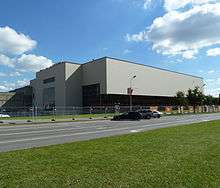Alytus
Alytus is a city with municipal rights in southern Lithuania. It is the capital of Alytus County. Its population in 2020 was 49,895. Alytus is the historical centre of the Dzūkija region. The city lies on the banks of the Nemunas River. The major roads linking Vilnius, Kaunas, Lazdijai (border with Poland), and Hrodna in Belarus pass through Alytus.
Alytus, Lithuania | |
|---|---|
City municipality | |
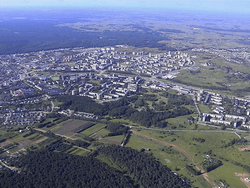 Panorama of Alytus | |
 Flag .svg.png) Coat of arms | |
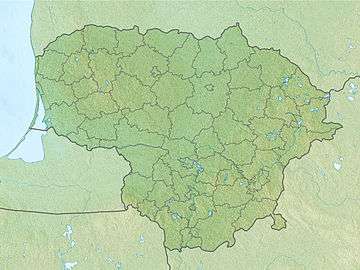 Alytus Location of Alytus 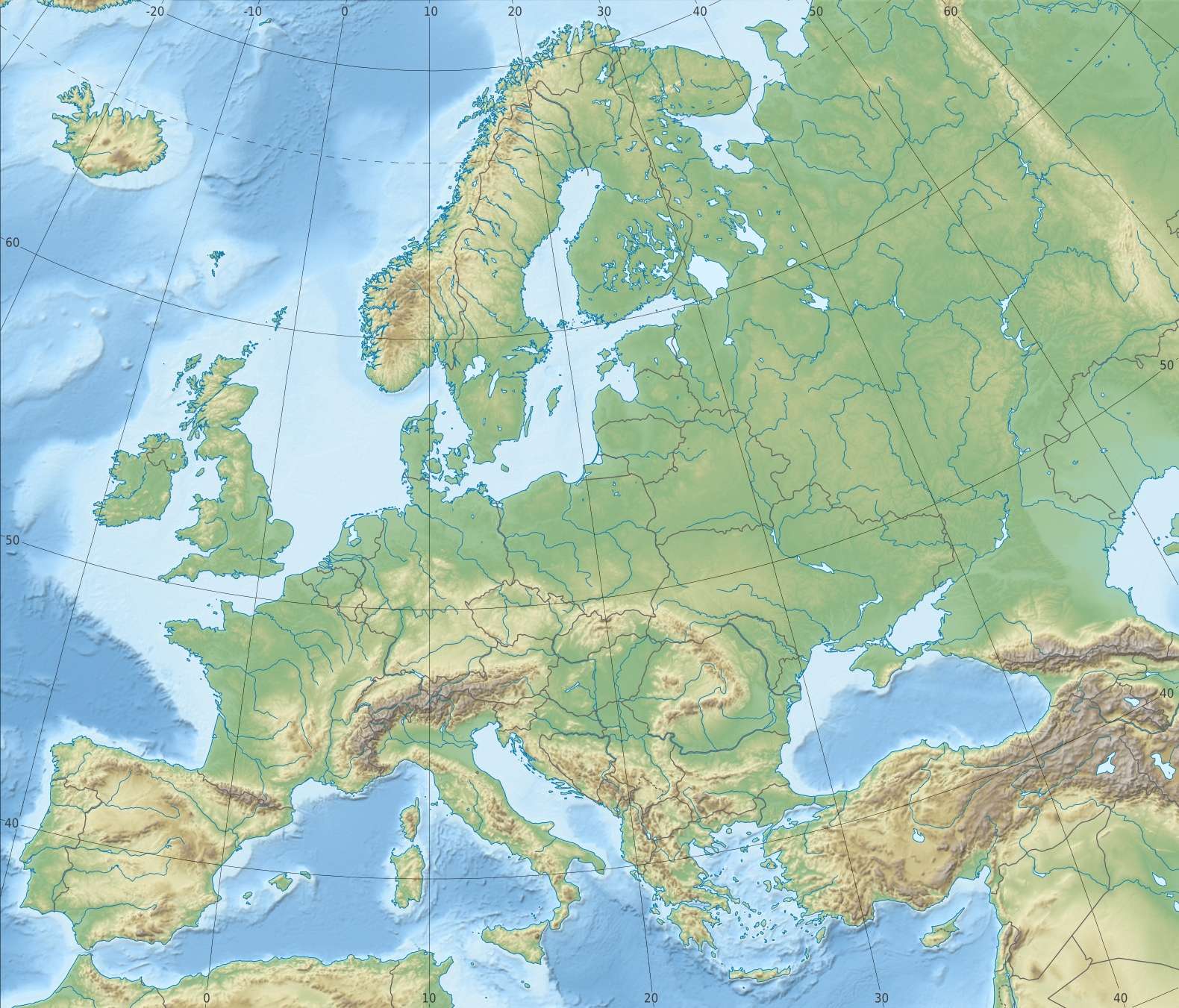 Alytus Alytus (Europe) | |
| Coordinates: 54°24′05″N 24°02′57″E | |
| Country | |
| Ethnographic region | Dzūkija |
| County | Alytus County |
| Municipality | Alytus city municipality |
| Capital of | Alytus County Alytus city municipality Alytus district municipality |
| First mentioned | 1377 |
| Granted city rights | 1581 |
| Area | |
| • Total | 40.0 km2 (15.4 sq mi) |
| Elevation | 200 m (700 ft) |
| Population (2020-01-01) | |
| • Total | 49,895 |
| • Density | 1,200/km2 (3,200/sq mi) |
| Time zone | UTC+2 (EET) |
| • Summer (DST) | UTC+3 (EEST) |
| Postal code | 62xxx |
| Area code(s) | (+370) 315 |
| Website | www |
Divided onto two separate entities for centuries, it consists of two parts still frequently referred to as Alytus I and Alytus II, the earlier being a smaller town and the latter forming the city centre with parks, microdistricts and industrial areas.
Name
The name is derived from the Lithuanian hydronym Alytupis. In other languages the names of the town include Polish: Olita, German: Aliten, Russian: Олита Olita, Belarusian: Аліта Alita, Yiddish: אליטע Alite.
History

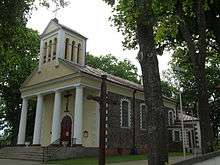

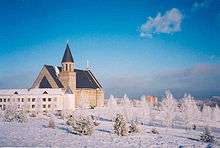
The first historical record of Alytus dates back to 1377,[1] when it was mentioned in the Chronicles of Wigand of Marburg under the name of Aliten. According to the chronicle the spot was occupied by a small, wooden fortress guarding the Lithuanian frontier with the Teutonic Order. The fort and the surrounding village gradually grew, despite being frequently a target of raids of both the Lithuanians and the Teutons. The Treaty of Lake Melno left the town on the Teutonic side of the border, but it was retaken soon afterwards. On 15 June 1581 Grand Duke of Lithuania and King of Poland Stefan Batory granted the town the city rights based on the Magdeburg Law. The event is celebrated as the Alytus Day.
Until the Partitions of the Polish–Lithuanian Commonwealth the town was a part of the Trakai Voivodeship of the Grand Duchy of Lithuania and a notable center of commerce on the Nemunas River, serving as the main route for export goods from Lithuania proper. The town was also important as the place where one of the royal economic offices was located. In the third partition of Poland and Lithuania, in 1795, the town was divided between the Russian Empire and the Kingdom of Prussia. During the Napoleonic Wars, following the Treaty of Tilsit, the western part was ceded to the Duchy of Warsaw. After the Congress of Vienna it became part of the duchy's successor state, the Kingdom of Poland. Although the state was tied with a personal union with Russia, both parts of the town remained completely separate until the January Uprising of 1863. After that date, the autonomy of Poland was liquidated, but both parts of the town remained governed separately.
In the late 19th century the town was incorporated into a chain of Russian fortified garrisons along the border with East Prussia. It was tied with the rest of the world by a railway and a new road. In addition, the tsarist authorities constructed several barracks and an Orthodox church (in modern times converted to a Catholic church). However, despite the fortification effort by the Russians, during World War I the Central Powers managed to capture the town intact, without any major skirmish. In 1915 the town was incorporated into the so-called Ober Ost and both parts were once again united into a single administrative entity for the first time since 1795.
Following the end of World War I the area remained contested by newly independent Poland and Lithuania, with the actual control held by the German army stationed in the area. When the Germans withdrew in early 1919, the town was seized by the Red Army. On 12 February 1919, the town became a battlefield for the first skirmish between the Russians and the Lithuanian forces, which eventually took control over it. Since then the town has been a part of the Republic of Lithuania.
Following the invasion of Poland a large prisoner of war camp for Polish soldiers was established in the city. Following the German occupation of the city in 1941, the camp was converted into a prison camp for Soviet soldiers (Stalag 343). In the nearby forest of Vidzgiris the Nazis murdered approximately 60,000 people, mostly Jews from nearby towns in Lithuania.[2]
In 2015 a HVDC back-to-back station for the realization of a power interconnection between Poland and Lithuania ( LitPol) was inaugurated west of Alytus. The facility built by ABB has a transmission capacity of 500 MW at a voltage of ±70 kV.
Climate
Alytus has a humid continental climate with quite large seasonal differences.[3]
| Climate data for Alytus | |||||||||||||
|---|---|---|---|---|---|---|---|---|---|---|---|---|---|
| Month | Jan | Feb | Mar | Apr | May | Jun | Jul | Aug | Sep | Oct | Nov | Dec | Year |
| Average high °C (°F) | −2.2 (28.0) |
−1.1 (30.0) |
3.9 (39.0) |
11.1 (52.0) |
18.3 (64.9) |
21.1 (70.0) |
22.2 (72.0) |
22.2 (72.0) |
16.7 (62.1) |
11.1 (52.0) |
4.4 (39.9) |
−0.6 (30.9) |
10.6 (51.1) |
| Daily mean °C (°F) | −5.0 (23.0) |
−4.4 (24.1) |
0.0 (32.0) |
6.1 (43.0) |
12.2 (54.0) |
15.6 (60.1) |
16.7 (62.1) |
16.7 (62.1) |
12.2 (54.0) |
7.2 (45.0) |
2.2 (36.0) |
−2.8 (27.0) |
6.4 (43.5) |
| Average low °C (°F) | −7.8 (18.0) |
−7.8 (18.0) |
−3.9 (25.0) |
1.1 (34.0) |
6.1 (43.0) |
10.0 (50.0) |
11.7 (53.1) |
10.6 (51.1) |
7.2 (45.0) |
3.3 (37.9) |
0.0 (32.0) |
−5.0 (23.0) |
2.1 (35.8) |
| Average rainfall mm (inches) | 41 (1.6) |
27 (1.1) |
36 (1.4) |
41 (1.6) |
56 (2.2) |
74 (2.9) |
80 (3.1) |
70 (2.8) |
60 (2.4) |
48 (1.9) |
51 (2.0) |
50 (2.0) |
634 (25.0) |
| Average precipitation days | 8 | 9 | 14 | 16 | 16 | 12 | 13 | 14 | 12 | 14 | 8 | 7 | 143 |
| Source: [4] | |||||||||||||
Culture

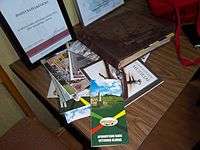
Alytaus Naujienos is a local newspaper in Alytus.
Alytus hosted the Art Strike Biennial between 18 and 24 August 2009 in response to Vilnius becoming European Capital of Culture for 2009. This included a demonstration[5] and a three sided football match.[6] The universal indoor Alytus Arena hosted the Eurobasket 2011 Group C matches in Alytus. In 2010 Alytus was awarded the Honourable Plate of the European Council.
Alytus has a museum dedicated to veterans of both the Afghan wars.
In Alytus, several Bonsai exhibitions were held with participants from European and other countries, such as Japan and the United States.
Alytus has hosted an annual Tomato tasting since 2007. Participants offer a wide variety of tomatoes and discuss the various factors which help produce a rich crop of the fruit.[7] Alytus has an industrial company named Snaigė, which manufactures refrigerators.[8]
Twin towns — sister cities
Alytus is twinned with:[9]
























References
- "History of Alytus City". Alytus tourism information centre. Archived from the original on 2008-06-28. Retrieved 2008-06-14.
- "The Jewish community of Alytus during World War II and afterwards (JewishGen article)". Archived from the original on 2009-06-09. Retrieved 2007-03-24.
- "Alytus, Lithuania Climate Summary". Weatherbase. Retrieved 17 June 2015.
- "Alytus, Lithuania Temperature Averages". weatherbase.com. Weatherbase. Retrieved 17 June 2015.
- 'Alytus -meno streiko sostine', Alytus Naujienos, Nr 15521st August 2009
- Alytus art strike: 3-sided football (trišalis futbolas) accessed 30 August 2009
- "POMIDORŲ DEGUSTACIJA". JŪSŲ DARŽUI. Retrieved 24 August 2013.
- Refrigerators | Freezers | A++ class refrigerators | SNAIGE
- "Miestai partneriai". alytus.lt (in Lithuanian). Alytus. Retrieved 2019-08-28.
External links
| Wikimedia Commons has media related to Alytus. |
